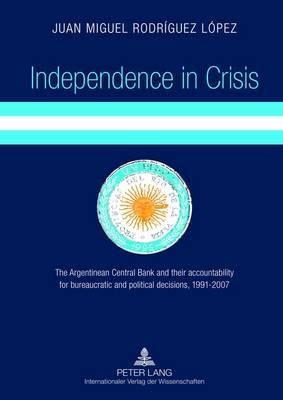
- We will send in 10–14 business days.
- Author: Juan Miguel RodrÃguez López
- Publisher: Peter Lang D
- ISBN-10: 3631638264
- ISBN-13: 9783631638262
- Format: 14.8 x 21 x 1.3 cm, kieti viršeliai
- Language: English
- SAVE -10% with code: EXTRA
Independence in Crisis; The Argentinean Central Bank and their accountability for bureaucratic and political decisions, 1991-2007 (e-book) (used book) | bookbook.eu
Reviews
Description
Central bankers like the idea of low inflation, but their actions have a distribution effect of richness. During the 1990s, the independence of central banks increased. What have central banks done with this independence? When we infer that all actors have interests, whether governments, voters or interest groups, why would we assume that central banks are technocratic institutions maximizing the welfare of the state? To answer these questions, this study looks at the Argentinean Central Bank between 1991 and 2007 and researches the incentives of a central bank to act strategically. This book uses a model which is an adaptation of Helmke's model (2002, 2005) for the Supreme Court of Justice. An inter-temporal conflict of interest explains the Central Bank's behavior.
EXTRA 10 % discount with code: EXTRA
The promotion ends in 22d.19:48:35
The discount code is valid when purchasing from 10 €. Discounts do not stack.
- Author: Juan Miguel RodrÃguez López
- Publisher: Peter Lang D
- ISBN-10: 3631638264
- ISBN-13: 9783631638262
- Format: 14.8 x 21 x 1.3 cm, kieti viršeliai
- Language: English English
Central bankers like the idea of low inflation, but their actions have a distribution effect of richness. During the 1990s, the independence of central banks increased. What have central banks done with this independence? When we infer that all actors have interests, whether governments, voters or interest groups, why would we assume that central banks are technocratic institutions maximizing the welfare of the state? To answer these questions, this study looks at the Argentinean Central Bank between 1991 and 2007 and researches the incentives of a central bank to act strategically. This book uses a model which is an adaptation of Helmke's model (2002, 2005) for the Supreme Court of Justice. An inter-temporal conflict of interest explains the Central Bank's behavior.


Reviews